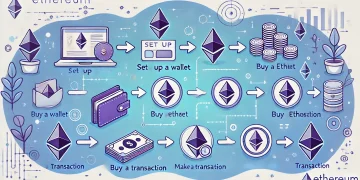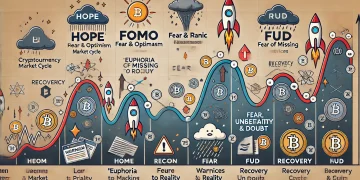1. Introduction to Blockchain in Supply Chain Management
Supply chains are intricate networks that involve multiple stakeholders—suppliers, manufacturers, distributors, and retailers. These networks span across various industries and nations, leading to operational inefficiencies, fraud, and lack of transparency. Blockchain technology, with its decentralized and immutable nature, promises to address many of these challenges by enhancing security, efficiency, and trust among participants.
Blockchain in supply chain management enables companies to track products from their origin to the final consumer, ensuring transparency and accountability. As a result, industries like food, pharmaceuticals, and luxury goods are increasingly adopting this technology to secure their supply chains.
2. What is Blockchain? A Brief Overview
Blockchain is a decentralized, distributed ledger technology that records transactions across multiple computers in a way that ensures data integrity, security, and immutability. Each “block” in a blockchain contains a list of transactions, and once these blocks are linked together (forming a chain), the data cannot be altered without changing all subsequent blocks—making it tamper-proof.
Blockchain operates on three key principles:
- Decentralization: No central authority controls the data.
- Transparency: All participants can view the transactions.
- Immutability: Data, once recorded, cannot be altered.
These characteristics make blockchain an ideal technology for supply chain management, where security, traceability, and transparency are paramount.
3. The Role of Supply Chain Management in Global Trade
Supply chain management involves coordinating the production, shipment, and distribution of goods and services. In today’s global economy, the supply chain plays a critical role in ensuring that products are available at the right place, at the right time, and at the right cost.
Despite its importance, traditional supply chain management faces several challenges, including:
- Lack of transparency: Often, it is difficult to track the journey of a product from raw materials to the finished goods.
- Fraud and counterfeiting: Counterfeit products, especially in industries like pharmaceuticals and luxury goods, cost businesses billions each year.
- High operational costs: Complex supply chains involve multiple intermediaries, driving up costs.
- Inefficiencies: Delays, errors, and disputes between stakeholders slow down the process.
Blockchain technology promises to streamline and enhance the supply chain by offering solutions to many of these challenges.
4. How Blockchain Enhances Transparency in Supply Chains
One of the primary benefits of blockchain in supply chain management is the enhanced transparency it provides. By recording every transaction in a decentralized ledger, all participants in the supply chain—whether suppliers, manufacturers, or consumers—can have a clear and real-time view of the entire process.
For instance, a company can use blockchain to track the movement of raw materials from the supplier to the factory. This data is then stored on the blockchain, accessible to anyone involved in the supply chain. This transparency allows businesses to:
- Identify bottlenecks in production and distribution.
- Verify the authenticity of products, ensuring that customers receive what they are promised.
- Enhance accountability, as each participant is held responsible for their role in the supply chain.
Moreover, consumers can benefit from this transparency. In industries like food and pharmaceuticals, where product authenticity is crucial, blockchain enables end-users to trace the journey of the product from its origin to their hands.
5. Improving Traceability with Blockchain Technology
Traceability is a major challenge in supply chain management. Traditional systems rely on manual tracking, which is prone to errors and fraud. With blockchain, companies can monitor each step of the supply chain, ensuring that products can be traced back to their origin.
For example, in the food industry, blockchain allows businesses to trace products from the farm to the table. This level of traceability is crucial in cases of product recalls, as it allows companies to quickly identify and isolate affected products.
Blockchain also enhances traceability in industries like:
- Pharmaceuticals, where the ability to trace the origin of medicines can help prevent the distribution of counterfeit drugs.
- Luxury goods, ensuring that consumers are purchasing authentic products rather than counterfeits.
- Electronics, where components can be traced to their source, ensuring ethical sourcing and compliance with regulatory standards.
6. Reducing Fraud and Counterfeiting in Supply Chains
Counterfeiting is a massive problem in global supply chains. Blockchain can significantly reduce fraud by providing a tamper-proof record of every transaction, making it nearly impossible for counterfeit goods to enter the supply chain undetected.
For example, in the pharmaceutical industry, counterfeit drugs can be life-threatening. Blockchain enables each product to be traced back to its manufacturer, ensuring its authenticity. Similarly, in the fashion industry, blockchain can be used to track high-value luxury items, providing customers with proof of authenticity.
7. Boosting Efficiency and Reducing Costs with Smart Contracts
Blockchain allows for the use of smart contracts, which are self-executing contracts with the terms of the agreement directly written into code. These contracts automatically enforce obligations and conditions, reducing the need for intermediaries and speeding up transactions.
Smart contracts can revolutionize supply chain management by:
- Automating payments when goods reach their destination, reducing delays and disputes.
- Streamlining procurement processes, eliminating the need for third-party verification.
- Reducing paperwork and administrative costs, leading to more efficient operations.
For example, a smart contract can be used between a manufacturer and a supplier. Once the supplier delivers the materials, the smart contract automatically triggers payment, eliminating delays and disputes.
8. Decentralization: Empowering Stakeholders in the Supply Chain
One of blockchain’s most revolutionary aspects is its decentralized nature. Traditional supply chains rely on central authorities or intermediaries to verify and execute transactions, which can be slow, expensive, and prone to error.
With blockchain, there is no need for a central authority to oversee the process. Every participant in the supply chain has access to the same information, and transactions are verified by the network. This decentralization:
- Empowers smaller stakeholders by giving them equal access to data and decision-making.
- Reduces the risk of data manipulation or fraud by any one party.
- Fosters trust among participants, as the system is transparent and immutable.
9. The Role of Blockchain in Sustainable Supply Chains
Sustainability is becoming a key focus for businesses and consumers alike. Blockchain can help create more sustainable supply chains by providing transparency and accountability regarding environmental and ethical practices.
For example, blockchain can track the carbon footprint of a product, from the sourcing of raw materials to the final product. This information can be used by companies to reduce their environmental impact and by consumers to make more informed purchasing decisions.
In the fashion industry, blockchain can be used to verify that materials were sourced ethically, helping companies meet sustainability goals and avoid scandals related to unethical sourcing practices.
10. Blockchain for Food and Pharmaceutical Supply Chains
The food and pharmaceutical industries are among the sectors most poised to benefit from blockchain technology due to the critical need for product safety, traceability, and authenticity.
- Food Supply Chains: Blockchain can help track food products from farm to fork, ensuring that consumers receive safe, fresh, and authentic products. In the event of contamination or recalls, blockchain can help pinpoint the exact source of the problem, allowing companies to respond swiftly and effectively.
- Pharmaceutical Supply Chains: Blockchain can combat the widespread issue of counterfeit drugs by ensuring that each medication can be traced back to its manufacturer. This can save lives by preventing the distribution of dangerous, fake medicines.
11. Case Studies: Real-World Applications of Blockchain in SCM
Several companies are already leveraging blockchain to enhance their supply chains:
- Walmart: The retail giant uses blockchain to track the origins of its fresh produce, ensuring transparency and reducing the time it takes to trace food from farm to store.
- IBM Food Trust: IBM’s blockchain-based platform enables food suppliers and retailers to monitor the journey of food products in real-time, improving food safety and reducing waste.
- Maersk: The shipping company uses blockchain to track its shipments, reducing paperwork and improving transparency in the supply chain.
12. Challenges of Implementing Blockchain in Supply Chain Management
While blockchain offers numerous benefits, there are still several challenges to its widespread adoption:
- Cost and complexity: Implementing blockchain requires significant investment in infrastructure and expertise.
- Interoperability issues: Different blockchains may not be able to communicate with each other, creating barriers for companies using different systems.
- Regulatory uncertainty: As blockchain is a relatively new technology, regulations are still evolving, which could complicate its adoption.
- Scalability: Blockchain networks, especially public ones, can struggle to handle large volumes of transactions efficiently.
13. The Future of Blockchain in Supply Chains
Despite the challenges, the future of blockchain in supply chain management looks promising. As the technology matures, we can expect more industries to adopt it, and for blockchain to become a standard tool for ensuring transparency, efficiency, and sustainability in supply chains.
In the future, blockchain could be integrated with other emerging technologies, such as artificial intelligence (AI) and the Internet of Things (IoT), to create even more intelligent and efficient supply chains.
14. Blockchain and IoT: A Perfect Match for SCM
The combination of blockchain and IoT (Internet of Things) can take supply chain management to the next level. IoT devices, such as sensors and RFID tags, can collect real-time data on the location, temperature, and condition of products as they move through the supply chain. Blockchain can then store this data securely, ensuring its accuracy and preventing tampering.
Together, these technologies can:
- Monitor perishable goods like food and pharmaceuticals in real-time, ensuring quality and safety.
- Track assets more accurately, reducing losses and delays.
- Improve inventory management by providing real-time data on stock levels and product locations.
15. FAQs About Blockchain and Supply Chain Management
1. How does blockchain improve transparency in supply chains? Blockchain records every transaction in a decentralized ledger, allowing all participants to access and verify information in real-time.
2. Can blockchain help reduce counterfeit products in supply chains? Yes, blockchain creates a tamper-proof record of each transaction, making it harder for counterfeit goods to enter the supply chain undetected.
3. What are smart contracts, and how do they benefit supply chains? Smart contracts are self-executing contracts that automatically enforce terms, reducing delays, disputes, and the need for intermediaries.
4. Is blockchain secure for supply chain management? Yes, blockchain is highly secure due to its decentralized and immutable nature, making it nearly impossible for data to be altered once recorded.
5. What industries are most likely to benefit from blockchain in SCM? Industries like food, pharmaceuticals, fashion, and electronics, where traceability and authenticity are crucial, are likely to benefit the most.
6. What are the challenges of adopting blockchain in supply chains? Challenges include high implementation costs, interoperability issues, regulatory uncertainty, and scalability concerns.
Conclusion
Blockchain is revolutionizing supply chain management by enhancing transparency, improving traceability, reducing fraud, and boosting efficiency. While there are challenges to its widespread adoption, the potential benefits far outweigh the obstacles. As blockchain technology continues to evolve, it is poised to become an essential tool for managing global supply chains in the future.


























